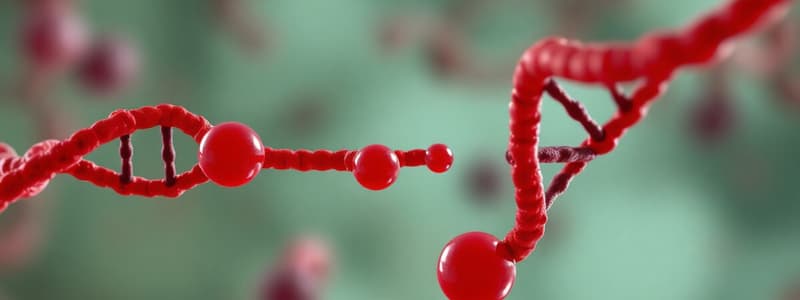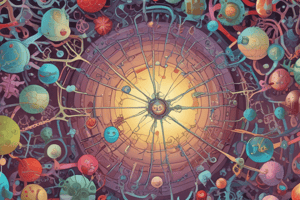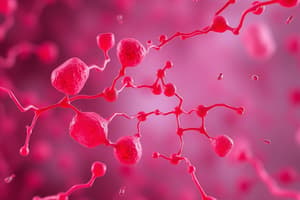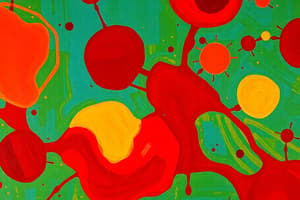Podcast
Questions and Answers
Bile acids are hydrophilic and do not require a carrier in the portal blood.
Bile acids are hydrophilic and do not require a carrier in the portal blood.
False (B)
Most of the uric acid enters the blood, and is eventually excreted in the urine.
Most of the uric acid enters the blood, and is eventually excreted in the urine.
True (A)
Theca cells are the source of androstenedione and testosterone.
Theca cells are the source of androstenedione and testosterone.
True (A)
Heme is synthesized from glycine and succinyl CoA precursors via a complex series of reactions.
Heme is synthesized from glycine and succinyl CoA precursors via a complex series of reactions.
Bilirubin is very water-soluble, so most of it is carried to the liver freely in the bloodstream.
Bilirubin is very water-soluble, so most of it is carried to the liver freely in the bloodstream.
Regulation of heme synthesis in erythroid cells occurs primarily at the ALA synthase enzyme.
Regulation of heme synthesis in erythroid cells occurs primarily at the ALA synthase enzyme.
The SSB proteins are enzymes that unwind dsDNA into ssDNA.
The SSB proteins are enzymes that unwind dsDNA into ssDNA.
The 3' →5' exonuclease activity is present in DNA polymerase I, and repairs the newly synthesized DNA chain.
The 3' →5' exonuclease activity is present in DNA polymerase I, and repairs the newly synthesized DNA chain.
Hormones, which act on intracellular receptors is - Thyroxine.
Hormones, which act on intracellular receptors is - Thyroxine.
The liver's inability to detoxify hydrogen peroxide, might lead to hepatic encephalopathy.
The liver's inability to detoxify hydrogen peroxide, might lead to hepatic encephalopathy.
Dopamine and norepinephrine are synthesized in the brain and function as neurotransmitters.
Dopamine and norepinephrine are synthesized in the brain and function as neurotransmitters.
Within kidney cells of the RE system, heme is degraded to bilirubin.
Within kidney cells of the RE system, heme is degraded to bilirubin.
DOPA is decarboxylated in a reaction requiring pyridoxine phosphate to form dopamine.
DOPA is decarboxylated in a reaction requiring pyridoxine phosphate to form dopamine.
Progesterone can serve as a precursor for mineralocorticoids.
Progesterone can serve as a precursor for mineralocorticoids.
Hydroxylases require molecular oxygen and NADPH are essential.
Hydroxylases require molecular oxygen and NADPH are essential.
DNA polymerases use only dsDNA as a template.
DNA polymerases use only dsDNA as a template.
Citric acid cycle intermediate could participate in Heme Biosynthesis.
Citric acid cycle intermediate could participate in Heme Biosynthesis.
The porphyrins are altered by decarboxylation and oxidation, and protoporphyrin IX is formed.
The porphyrins are altered by decarboxylation and oxidation, and protoporphyrin IX is formed.
The major androgen synthesized by adrenal medulla is dehydroepiandrosterone (DHEA).
The major androgen synthesized by adrenal medulla is dehydroepiandrosterone (DHEA).
DNA polymerases cannot initiate the synthesis of a complement strand of DNA on a totally single stranded template; rather, they require a Ribose-Primer.
DNA polymerases cannot initiate the synthesis of a complement strand of DNA on a totally single stranded template; rather, they require a Ribose-Primer.
Glycogen phosphorylase and DNA synthase require a primer.
Glycogen phosphorylase and DNA synthase require a primer.
In the hemolytic jaundice, it is mainly conjugated bilirubin that increases, because liver is intact.
In the hemolytic jaundice, it is mainly conjugated bilirubin that increases, because liver is intact.
Hyperuricemia is typically asymptomatic and does not lead to gout.
Hyperuricemia is typically asymptomatic and does not lead to gout.
DNA is negatively charged, histones and Ca2+ ions help to neutralize the charge.
DNA is negatively charged, histones and Ca2+ ions help to neutralize the charge.
Estrogens are formed by the aromatization of androgens, which requires CO2 and NADPH.
Estrogens are formed by the aromatization of androgens, which requires CO2 and NADPH.
Flashcards
Bile acid transport
Bile acid transport
Bile acids need a carrier protein because they are not water-soluble and require assistance for transport in the blood.
Uric acid excretion
Uric acid excretion
Uric acid is filtered into the blood and eventually excreted from the body through urine.
Theca cell function
Theca cell function
Theca cells in the ovaries produce androstenedione and testosterone, which are precursors to estrogen.
Heme precursors
Heme precursors
Signup and view all the flashcards
Bilirubin transport
Bilirubin transport
Signup and view all the flashcards
Heme synthesis regulation
Heme synthesis regulation
Signup and view all the flashcards
SSB protein function
SSB protein function
Signup and view all the flashcards
DNA Polymerase proofreading
DNA Polymerase proofreading
Signup and view all the flashcards
Hormone: Thyroxine
Hormone: Thyroxine
Signup and view all the flashcards
Ammonia detoxification
Ammonia detoxification
Signup and view all the flashcards
Dopamine and norepinephrine
Dopamine and norepinephrine
Signup and view all the flashcards
Heme degradation
Heme degradation
Signup and view all the flashcards
Dopamine synthesis
Dopamine synthesis
Signup and view all the flashcards
Progesterone as precursor
Progesterone as precursor
Signup and view all the flashcards
Hydroxylase requirements
Hydroxylase requirements
Signup and view all the flashcards
DNA polymerase template
DNA polymerase template
Signup and view all the flashcards
CAC in Heme Synthesis
CAC in Heme Synthesis
Signup and view all the flashcards
Protoporphyrin IX formation
Protoporphyrin IX formation
Signup and view all the flashcards
Adrenal Androgen
Adrenal Androgen
Signup and view all the flashcards
DNA synthesis initiation
DNA synthesis initiation
Signup and view all the flashcards
Synthase Primer
Synthase Primer
Signup and view all the flashcards
Conjugated bilirubin in jaundice
Conjugated bilirubin in jaundice
Signup and view all the flashcards
DNA charge neutralization
DNA charge neutralization
Signup and view all the flashcards
Estrogen synthesis
Estrogen synthesis
Signup and view all the flashcards
Aminotransferases not only Liver disease
Aminotransferases not only Liver disease
Signup and view all the flashcards
Study Notes
- Bile acids are hydrophobic and need a carrier in the portal blood
- Most uric acid enters the blood, and is eventually excreted in the urine.
- Theca cells produce androstenedione and testosterone
- Heme is synthesized from glycine and succinyl CoA via a complex series of reactions
- Bilirubin's low water solubility means it's transported in the blood bound to albumin
- Heme synthesis in erythroid cells is regulated at several steps, including by ferrochelatase
- SSB proteins are not enzymes, but stabilize single-stranded DNA.
- DNA polymerase III possesses 3' → 5' exonuclease activity for proofreading newly synthesized DNA
- Thyroxine acts on intracellular receptors
- Liver's inability to detoxify ammonia may lead to hepatic encephalopathy
- Dopamine and norepinephrine are neurotransmitters synthesized in the brain
- Within cells of the RE system, heme is degraded to bilirubin
- DOPA is decarboxylated to dopamine, requiring pyridoxal phosphate (PLP)
- Progesterone can serve as a precursor for mineralocorticoids
- Hydroxylases that require molecular oxygen and NADPH are essential
- Polymerases use only single-stranded DNA as a template
- Citric acid cycle intermediates can participate in Heme Biosynthesis
- Porphyrins are modified by decarboxylation and oxidation to form protoporphyrin IX
- Dehydroepiandrosterone (DHEA) is the main androgen synthesized by the adrenal cortex
- DNA polymerases require an RNA primer to initiate DNA synthesis on a single-stranded template
- Glycogen synthase and DNA synthase need a primer
- Obstructive jaundice primarily increases conjugated bilirubin due to an intact liver
- Hyperuricemia is typically asymptomatic and does not lead to gout
- DNA's negative charge is neutralized by histones and Mg2+ ions
- Estrogens are produced by aromatization of androgens, requiring O2 and NADPH
- Elevated aminotransferase levels may occur in nonhepatic diseases
- Increased plasma concentration of aminotransferases indicates possible pathology, as they are intracellular enzymes
- Citrulline is a non-protein amino acid that's an intermediate in urea biosynthesis
- The rate-limiting step of heme biosynthesis is the condensation of glycine and succinyl CoA to form -aminolevulinic acid (ALA)
- Ribonucleotide reductase is made of two nonidentical dimeric subunits
- Cyclic AMP was the first identified intracellular second messenger in mammalian cells
- The liver synthesizes more heme than other organs to maintain high cytochrome levels
- The purine ring is primarily constructed in the liver. Not the kidneys
- Telomeres are noncoding DNA and protein complexes at the ends of linear chromosomes
- Phosphatidic acid is the simplest phosphoglyceride
- Genetic defects in glycosphingolipid degradation lead to lysosomal accumulation
- Prostaglandin endoperoxide synthase catalyzes arachidonic acid turning to PGH2
- Infant RDS (Respiratory distress syndrome) is caused by deficiency of lung surfactant
- Thromboxanes, synthesized in platelets, cause vasoconstriction and platelet aggregation upon release
- Sulfasalazine or indomethacin can prolong the half-life of prostaglandins by blocking their breakdown
- Diastole is shortened when HR is increased
- Glycosphingolipids are internalized by endocytosis.
- Cholera and pertussis toxins catalyze the ADP ribosylation of as and ai - 2, respectively
- Glycerophospholipids make up the major class of phospholipids
- Tyrosine is formed from phenylalanine by phenylalanine hydroxylase
False Statements and Corrections
- Androstenedione reduction forms not Glucagon, but a different, less potent androgen. Glucagon doesn't result from this modification.
- Phosphate groups give nucleotides negative charges. This is why they are called nucleic acids
- The main metalloporphyrin is heme which has a ferrous Fe 2+ iron atom
- Most of the urobilinogen is oxidized to stercobilin, which turns the feces brown
- Creatinine is synthesized in the muscles and excreted by the help of kidney
- Creatinine and urea elevation could be an indicator for Congestive Heart Failure or Kidney Disease.
- Gout is a disorder characterized by high levels of uric acid— the end product of purine catabolism—in blood (Hyperuricemia)
- Initiation codon almost always encodes amino acid Methionine
- Thyroxine-binding globulin is the transporter plasma protein for thyroid hormones – T3, T4.
- Insulin's α and β chains are distinct and responsible for hormone specificity
- Ferrochelatase increases the rate of iron insertion into protoporphyrin IX
- Hormones may act as signal molecules and regulators
- Leucine and lysine are the only exclusively ketogenic amino acids found in proteins
- The catecholamines are synthesized from Tyrosine
- Hemin inhibits ALA synthase by using an allosteric mechanism and by repressing its synthesis
- Bilirubin is conjugated to two molecules of glucuronic acid, creating bilirubin diglucuronide
- Most of the urobilinogen is oxidized to urobilin, which turns the urine brown.
- Inside a polysome, ribosomes are translating the same type of proteins.
- Catecholamine degradation results in the synthesis of S-adenosylhomocysteine
- PKU test screens newborn babies on phenylketonuria.
- Neonatal jaundice due to liver immaturity produces unconjugated (water insoluble) hyperbilirubinemia
- When the codon changes and the changed base codes the same amino acid, mutation is called: “Silent”.
- The strand that is being copied in the direction of the advancing replication fork is called the leading strand and is synthesized continuously is Leading strand
- Biliverdin is the product of heme synthesis and bilirubin is the catabolism product.
- The bile acids are amphipathic
- Bilirubin is conjugated in the liver by glucuronil transferase
- The very first step in pyrimidine synthesis is the formation of carbamoyl phosphate, catalyzed by carbamoyl phosphate synthetase II.
- Phosphodiester bonds join the 5'-phosphate group of the deoxy-pentose of one nucleotide to the 3'-hydroxyl group of the deoxy pentose of an adjacent nucleotide through a phosphate group
- 5-hydroxytryptophan is decarboxylated to serotonin, which is also degraded by MAO
- Conjugated bilirubin is normally secreted
- The phosphoprotein phosphatase are themselves subject to regulation by phosphorylation dephosphorylation reactions.
- Erythroid tissue produces only ALAS2 , the gene for which is located on the Xchromosome
- Heme is synthesized from glycine and succinyl-CoA in humans. It’s derived from porphyrin
- Heme synthesis in the liver can be induced by drug consumption.
- Hormones are synthesized in specialized organs and tissues
- Inhibitors of human purine synthesis aren't extremely toxic to tissues with high rate of cell division
- Phenylalanine is converted to tyrosine by hydroxylation reactions
- The bacteria in the intestine convert bilirubin to urobilins, which gives urine its color.
- Cortisol inhibits phospholipase A2 activity
- Glycerophospholipids are formed from diacylglycerol, phosphate and an alcohol
- In the liver bilirubin reacts with UDP-glucuronate to form bilirubin monoglucuronide, which is converted to the diglucuronide.
- Degradation of Glycolipids happen in Lysosomes
- Insulin has distinct α and β chains which impart hormone uniqueness. Not identical chains
- Leukotrienes synthesis is affected by lipoxygenase inhibitors , not NSAIDs
- Niemann-Pick disease caused by the inability to degrade sphingomyelin.
Studying That Suits You
Use AI to generate personalized quizzes and flashcards to suit your learning preferences.




